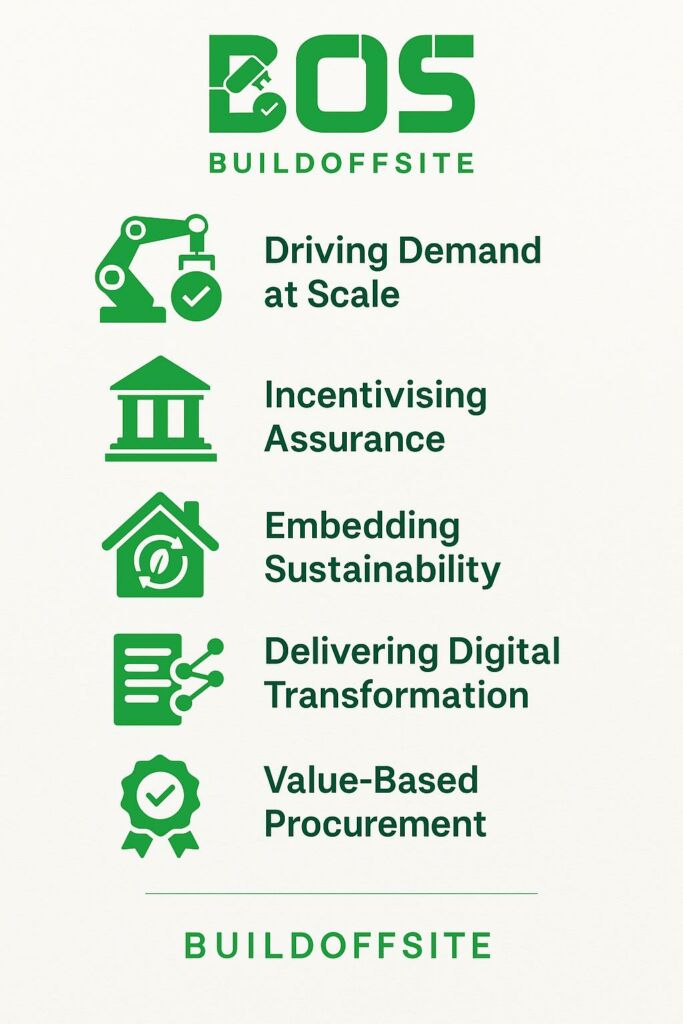BUILDOFFSITE’S Response to the 2025 UK Industrial Strategy
“Why Are We Still Building in Risk?”
The 2025 UK Industrial Strategy sets a bold agenda for innovation, infrastructure, and long-term growth. We welcome its commitment to revitalising British industry, unlocking investment in high-growth sectors, and supporting the journey to net zero.
But if we’re serious about safety, productivity, and economic resilience, we must ask:
Why are we still building in risk—when we have tested tools to eliminate it?
❌ The Status Quo Still Carries Risk
Traditional construction practices—fragmented, on-site, and labour-dependent—introduce systemic risk:
Inconsistent quality, snagging, material waste and variable workmanship
Complex, hard-to-monitor supply chains
Limited traceability or assurance of safety and durability
In a post-Grenfell, post-Building Safety Act world, this model is no longer fit for purpose. Yet it still dominates procurement pipelines.
If you have not yet we urge you to watch: Greenfell Documentary on Netflix.
✅ MMC + Assurance = Safer, Smarter Delivery
Modern Methods of Construction (MMC)—when backed by credible assurance schemes like BOPAS—offer a safer, smarter, and more scalable alternative:
🔧 Precision-built systems ensure consistent quality and tighter tolerances under factory conditions
📲 Digital traceability enables a Golden Thread aligned with the Building Safety Act
🔁 Repeatable systems mean performance is proven—not assumed
📜 PAS 8700, the new BSI standard, sets out performance expectations across the MMC lifecycle
“The question isn’t whether MMC can replace traditional methods. The question is why we continue to rely on high-risk practices—when safer, assured systems are already available.”
— Fareita Udoh, Buildoffsite
📉 Gaps in the Industrial Strategy
While the Strategy rightly references innovation, clean growth, and investment in high-productivity sectors, it falls short on construction in three key areas:
❌ No mention of BOPAS, the UK’s leading assurance framework for MMC
❌ No clear shift away from high-risk, traditional build methods in safety-critical settings
❌ Retrofit and digital housing upgrades are not yet recognised as strategic industrial capabilities
❌ No fast-track planning or procurement incentives for assured building systems
These are missed opportunities to deliver on the Strategy’s stated aims: de-risking investment, boosting productivity, and creating good jobs.
🔁 Our Call to Action
To realise the Strategy’s ambition, we urge policymakers, funders, and public sector clients to:
- Treat MMC as risk mitigation—not innovation risk: When systems are assured, traceable, and proven, the burden of proof should no longer fall on them.
- Recognise BOPAS in national policy and investment frameworks: As CE/UKCA marking denotes quality in manufacturing, BOPAS certifies the durability, insurability, and safety of modern building systems
- Mandate assurance-first approaches in regulated setting: If we want zero harm and net zero, MMC must be the new normal—and assurance must be non-negotiable
“If we’re serious about building back better, safer, and greener—then trust must be built in from the start.”
— Sean McCormick, LRQA / BOPAS
The 2025 Industrial Strategy sets the direction of travel. But to deliver safe, scalable, and sustainable results, we must stop treating MMC as the exception—and start treating it as the default.
When the question is asked—
“Why didn’t you choose the safer option?”
Let’s ensure the answer is never:
“Because we didn’t recognise it in the strategy.”

